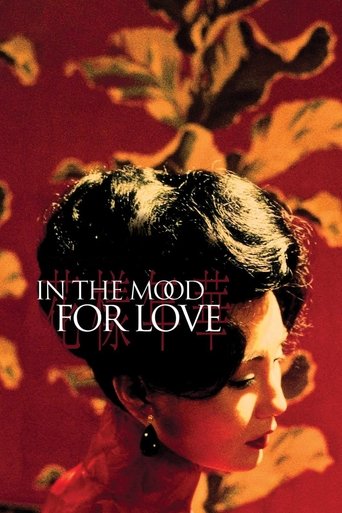Feel the heat, keep the feeling burning, let the sensation explode.
Dù ở nơi đất khách quê người nhưng Châu Mộ Vân vẫn không thể nào quên được mối tình giữa anh và Tô Lệ Trân, nếu năm xưa cô quyết định theo anh ra đi thì giờ đây họ sẽ là một đôi tình nhân hạnh phúc hay vẫn phải chia cách? Có lẽ sẽ có người nói rằng từ ngày đầu tiên khi hai người họ cùng trong một ngày cùng dọn vào một căn nhà trọ và trở thành hàng xóm của nhau thì vận mệnh đã dần đưa hai người họ xích lại gần nhau hơn, và rồi ngẫu nhiên phát sinh những mối quan hệ không thể cho ai biết được.
"花樣年華" (In the Mood for Love), released in 2000, is a cinematic masterpiece co-produced by Block 2 Pictures and Jet Tone Films, hailing from France and Hong Kong. Directed by the visionary Wong Kar-wai, the film delicately explores the themes of love, longing, and societal constraints through the lives of two neighbors, Mr. Chow and Mrs. Chan, who suspect their spouses of infidelity. Set in the bustling yet claustrophobic streets of 1960s Hong Kong, the film's visual and auditory elements create an immersive experience that captures the essence of repressed emotions and unspoken desires. The film's narrative is a slow-burning exploration of the protagonists' evolving relationship, marked by subtle glances and hesitant conversations. As Mr. Chow and Mrs. Chan grow closer, they grapple with the moral implications of their burgeoning connection, choosing to role-play their spouses' affair as a way to understand and perhaps resist their own feelings. This poignant dance of proximity and distance is masterfully portrayed by actors Tony Leung and Maggie Cheung, whose performances earned them widespread acclaim and numerous awards. Visually, "花樣年華" is a feast for the eyes, with cinematographer Christopher Doyle's use of vibrant colors and tight framing accentuating the film's emotional intensity. The recurring motif of narrow alleyways and dimly lit rooms mirrors the characters' internal struggles and the societal pressures they face. The haunting score by Shigeru Umebayashi, particularly the recurring theme "Yumeji's Theme," adds another layer of melancholy and yearning, perfectly complementing the film's mood. "In the Mood for Love" transcends its cultural setting to speak universally about the human condition. It is a testament to the power of restraint and subtlety in storytelling, leaving audiences with a lingering sense of what could have been. The film's enduring appeal lies in its ability to evoke deep emotional responses through its meticulous craftsmanship and profound thematic exploration, cementing its status as a timeless work of art.
Năm:2000
Ngân sách150000$
Doanh thu14204632$
Xem trực tuyến duckduckgo
Thể loạiPhim Chính KịchPhim Lãng Mạn
Các quốc gia sản xuấtFranceHong KongNetherlands



